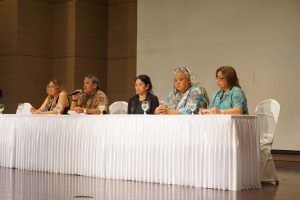ON CW CRISIS
‘Big businesses might survive, small businesses won’t’

From left, Gloria Cavanagh, Alex Sablan, Velma Palacios, Viola Alepuyo, and Josephine Mesta, officers and members of the Northern Marianas Business Alliance Corp. who went to Washington, D.C. to lobby for a legislation that is viable to the CNMI economy, at yesterday’s Society for Human Resource Management meeting. (Bea Cabrera)
This is the reality that the members of the Northern Marianas Business Alliance Corp. shared at the general meeting of the Society for Human Resource Management held yesterday at the Royal Taga Hall of the Saipan World Resort.
“This is not a situation of local vs. CW. We are not an island of just Chamorros and Carolinians or U.S. citizens and this makes us the absolute melting pot of the U.S. Our neighbors are our families and sadly this law is tearing our families apart. We need to put differences aside, find a common ground, and start working together,” said NMBAC board member Viola Alepuyo
“The big businesses might be able to survive, the small businesses won’t and when they don’t survive, it’s going to hurt all of us,” she added.
According to Alepuyo, the dynamics in the Commonwealth is unique as everything is connected. When one end is hurting, the other end will experience the same.
“There’s a hotel where half of their employees, all CWs, have not gotten approval from the U.S. Citizenship Immigration Services. This hotel is already talking about closing down. The other half of their workforce are U.S. citizens so when those foreign workers go home, guess what happens to those U.S. citizens workers? They lose their jobs,” she said.
“When the hotel closes down guess what happens to the small businesses that provide services to the hotel? They lose a customer and may close down. It’s a domino effect,” she said.
NMBAC officer Velma Palacios said that small businesses should be a concern as a lot of the small businesses don’t have the tools or provisions that the big businesses have.
“Small businesses do not have human resources personnel to assist them and a lot of their workers do not qualify for H-1 visas so they have to use the CW-1 program,” she said.
“Just this morning I met with three businesses that have been here in the CNMI for over 20 years. They were all contemplating the worst such as closing their businesses because some have already received denials and some still have not received any word from USCIS. It is a shame to see them close,” she added.
Palacios said what NMBAC is fighting for is the CNMI economy and the non-closure of the small businesses.
“We get a lot of negative comments like ‘oh we don’t need CW workers’ but people have to realize we need both—sufficient workforce and an economy,” she said.
“We do not have that many workers to fill all the jobs that we have right now and a lot of positions that are open but people don’t prefer to be in that position,” she added.
Alepuyo said that the NMBAC’s role is to educate because decision makers in the mainland do not know how it is to live in the CNMI.
“The United States of America hundreds of years ago did not have an economy to speak of. Whether you call them foreign workers or immigrants, they are the same thing. People from other countries came in order to help you build. That’s what happened to the U.S.,” she said.
“Our economy, our Commonwealth is in its infancy compared to the U.S. Unfortunately, we have to work under their rules more so sometimes, they make decisions without consulting us. So we are here to educate and we will keep doing it,” she added.



























